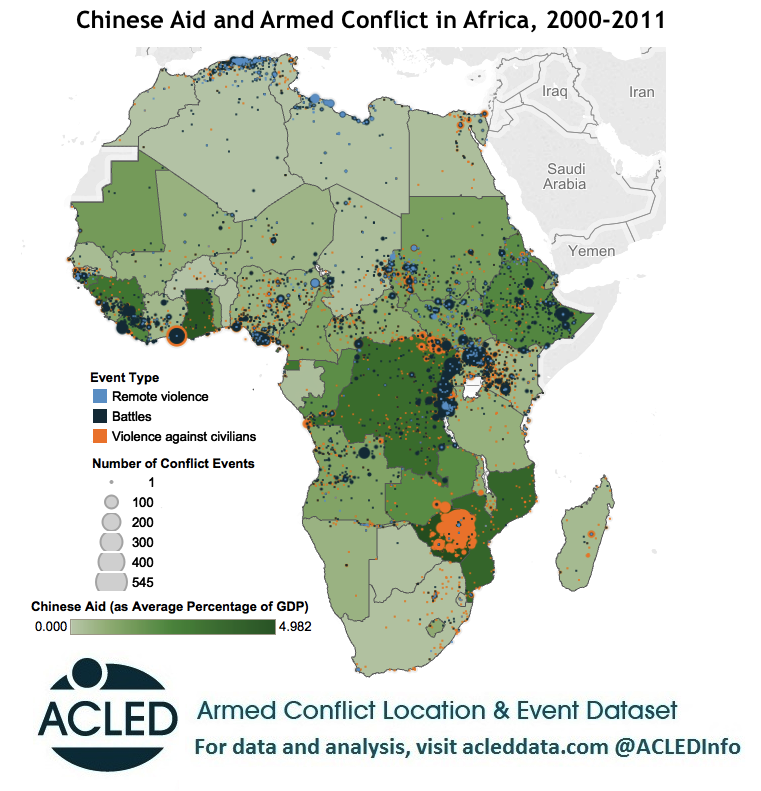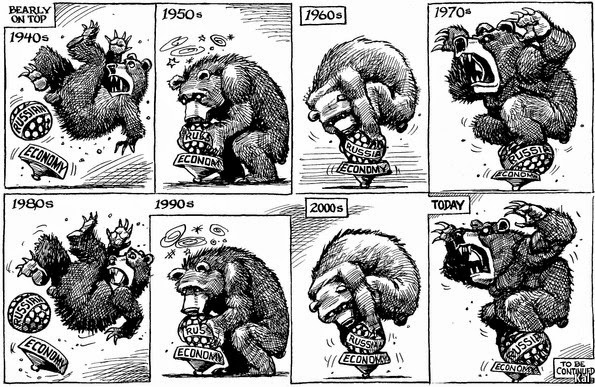
GEOPOLÍTICA
Moderador: Conselho de Moderação
- cassiosemasas
- Sênior

- Mensagens: 2700
- Registrado em: Qui Set 24, 2009 10:28 am
- Agradeceu: 87 vezes
- Agradeceram: 86 vezes
-
hades767676
- Sênior

- Mensagens: 910
- Registrado em: Dom Abr 06, 2008 1:29 am
- Localização: Brasil
- Agradeceu: 7 vezes
- Agradeceram: 85 vezes
Re: GEOPOLÍTICA
Não deixa de ser interessante ouvir comentários de ex-chefes militares ingleses que em um confronto direto a Royal Air Force não teria a menor chance contra a VVS.
-
hades767676
- Sênior

- Mensagens: 910
- Registrado em: Dom Abr 06, 2008 1:29 am
- Localização: Brasil
- Agradeceu: 7 vezes
- Agradeceram: 85 vezes
Re: GEOPOLÍTICA
Ha quem não entende a revolta dos gregos:
Milhões de gregos vivem sem eletricidade, sem cobertura de saúde, sem trabalho
Há dois anos que Giorgos e Evgenia Kouzilos vivem sem eletricidade. São forçados a manter os três filhos, à luz das velas e não são os únicos. Milhares de famílias, na Grécia, não podem dar-se ao luxo de pagar as contas de energia elétrica. De acordo com o governo de Atenas são 300 mil famílias que vivem abaixo do limiar da pobreza e às escuras.
Giorgos Kouzilos – A situação é muito difícil para a minha mulher e, principalmente, para os meus filhos. Tentamos fazer todas as atividades diárias, incluindo ajudar os nossos filhos com os trabalhos, enquanto â luz do dia.
Michalis Tsaousoglou dedica-se ao fornecimento de produtos básicos num banco alimentar, nos arredores de Atenas. Camionista desempregado há cinco anos, depois de 35 de trabalho e a pagar impostos, Michalis, há seis meses que também não consegue pagar a renda e tem 12 meses de contas de luz e água em atraso. Em 2014, não conseguiu ganhar um único euro.
Michalis Tsaoussoglou – Para ser honesto, sinto-me um inútil, como se estivesse sujo, como se não existisse.
Assim como a família Tsaousoglou, 21% das famílias gregas passaram fome durante o ano lectivo de 2013/14, e 54% não tiveram uma alimentação garantida, segundo o instituto Hellenic Prolepse.
Outra consequência terrível de seis anos de recessão é que 2 milhões de gregos, numa população de 10 milhões e meio, deixaram de ter acesso ao sistema de saúde pública. A maior parte saiu da classe média, pessoas que prederam o emprego, o negócio, ou jovens que nunca conseguiram come4ar a trabalhar. Na Grécia, ao perder o trabalho, o contribuinte perde também a cobertura da Saúde.
A taxa de desemprego permanece muito elevada: 25,8% em novembro, 50,6% no setor dos jovens com menos de 25 anos de idade. Apesar de uma recuperação modesta, 1,7% do PIB no quarto trimestre de 2014, a economia grega continua a destruir empregos, como no caso da cimenteira do grupo Lafarge, em Chalkida Evia, em janeiro passado.
Stelios Fotias – A empresa anunciou uma demissão em massa, de cerca de 226 funcionários. Não pediram a demissão de 50, 60, 70 pessoas. Agora é uma questão de tempo. Vamos todos ser demitidos, é só esperar. Este mês, no próximo, ou no seguinte, mais cedo ou mais tarde, estaremos acabados.
Nos últimos três anos, os casos de suicídio na Grécia aumentaram 35,7%, desde 2011, com um pico em 2012.
Copyright © 2015 euronews
Milhões de gregos vivem sem eletricidade, sem cobertura de saúde, sem trabalho
Há dois anos que Giorgos e Evgenia Kouzilos vivem sem eletricidade. São forçados a manter os três filhos, à luz das velas e não são os únicos. Milhares de famílias, na Grécia, não podem dar-se ao luxo de pagar as contas de energia elétrica. De acordo com o governo de Atenas são 300 mil famílias que vivem abaixo do limiar da pobreza e às escuras.
Giorgos Kouzilos – A situação é muito difícil para a minha mulher e, principalmente, para os meus filhos. Tentamos fazer todas as atividades diárias, incluindo ajudar os nossos filhos com os trabalhos, enquanto â luz do dia.
Michalis Tsaousoglou dedica-se ao fornecimento de produtos básicos num banco alimentar, nos arredores de Atenas. Camionista desempregado há cinco anos, depois de 35 de trabalho e a pagar impostos, Michalis, há seis meses que também não consegue pagar a renda e tem 12 meses de contas de luz e água em atraso. Em 2014, não conseguiu ganhar um único euro.
Michalis Tsaoussoglou – Para ser honesto, sinto-me um inútil, como se estivesse sujo, como se não existisse.
Assim como a família Tsaousoglou, 21% das famílias gregas passaram fome durante o ano lectivo de 2013/14, e 54% não tiveram uma alimentação garantida, segundo o instituto Hellenic Prolepse.
Outra consequência terrível de seis anos de recessão é que 2 milhões de gregos, numa população de 10 milhões e meio, deixaram de ter acesso ao sistema de saúde pública. A maior parte saiu da classe média, pessoas que prederam o emprego, o negócio, ou jovens que nunca conseguiram come4ar a trabalhar. Na Grécia, ao perder o trabalho, o contribuinte perde também a cobertura da Saúde.
A taxa de desemprego permanece muito elevada: 25,8% em novembro, 50,6% no setor dos jovens com menos de 25 anos de idade. Apesar de uma recuperação modesta, 1,7% do PIB no quarto trimestre de 2014, a economia grega continua a destruir empregos, como no caso da cimenteira do grupo Lafarge, em Chalkida Evia, em janeiro passado.
Stelios Fotias – A empresa anunciou uma demissão em massa, de cerca de 226 funcionários. Não pediram a demissão de 50, 60, 70 pessoas. Agora é uma questão de tempo. Vamos todos ser demitidos, é só esperar. Este mês, no próximo, ou no seguinte, mais cedo ou mais tarde, estaremos acabados.
Nos últimos três anos, os casos de suicídio na Grécia aumentaram 35,7%, desde 2011, com um pico em 2012.
Copyright © 2015 euronews
- cassiosemasas
- Sênior

- Mensagens: 2700
- Registrado em: Qui Set 24, 2009 10:28 am
- Agradeceu: 87 vezes
- Agradeceram: 86 vezes
Re: GEOPOLÍTICA
THE NEW COLD WAR?
Former Diplomatic Correspondent for The Times Michael Binyon observes how recent events could reverse all positive changes made between Russia and the West
Have Russia and the West begun a new Cold War? To those who remember the long East-West confrontation that ended with the fall of the Berlin Wall, things are looking ominously similar: Russian tanks and weapons crossing into neighbouring territories, high-level Nato exercises close to the Russian frontier, Russian fighter planes intruding into Western airspace, accusations of spying, the tit-for-tat expulsions of diplomats, Kremlin accusations that the West is trying to destabilise Russia and newspaper headlines around the world warning of a new confrontation with Moscow.
For the past few years, Moscow’s open hostility to Western diplomacy, its obstruction of Western global initiatives and its attacks on Western-backed non-governmental organisations have all suggested that President Putin has abandoned his earlier hopes of closer co-operation with Europe and the US. But in recent months the Russian leader’s rhetoric has grown harsher, his anger more palpable and his reactions more defiant. Anyone now listening to Kremlin accusations or watching Russian television would imagine that nothing had changed since Soviet days. The collapse of the rouble as a result of Western sanctions and the fall in the oil price has further convinced the Kremlin, and many ordinary Russians, that the West is now as hostile as it was 40 years ago.
The turning-point, of course, was the Russian attack on Crimea and Moscow’s subsequent intervention in eastern Ukraine. These actions, a violation of the postwar order in Europe, triggered a Western reassessment of Putin’s Russia. Clearly, it was no longer a partner. Indeed, it was rapidly becoming an enemy. This led to the imposition of Western sanctions, denunciations of Russian policy and a hasty revival of the defensive strategies against possible future aggression last seen in Soviet times.
It is, however, only in the past few months that the world has seen a full-scale revival of Cold War rhetoric and Cold War hostilities. The last high-level attempt to restrain Moscow’s actions in Ukraine and promote a peaceful settlement collapsed at the G20 summit in Australia in November. This saw blunt speaking on an unprecedented level. Canada’s Prime Minister Stephen Harper told Putin to his face that he was shaking hands only because he was obliged to, and had only one message for the Russian leader: “You need to get out of Ukraine.” Other leaders were just as outspoken, and Putin left the summit early.
But the real sign that the last diplomatic channel of communication is now blocked came at the end of Angela Merkel’s lengthy private meeting with Putin. Germany’s Chancellor, who used to speak regularly to him, spent four frustrating hours trying to persuade him to change course in Ukraine. She failed. She subsequently made her anger known at what she saw as Putin’s refusal to engage and his lying about the scale of Russian involvement in support of the Ukrainian separatists. If Berlin breaks off its talks with Moscow, there will be no remaining bridge across the growing East-West divide.
Instead, the East-West crisis seems to be gathering pace. Almost every day brings fresh news of confrontation, accusations and a worsening atmosphere. In Russia, Western sanctions are accelerating the effects of the disastrous drop in the oil price. The rouble has fallen precipitately in value. Imported luxuries are disappearing and many Russians can no longer afford some basic items. Huge capital sums are fleeing the country. Many Russian civil servants are now forbidden to travel abroad because the government wants to encourage them to holiday instead in Crimea, in an effort to offset the huge bill Russia now faces for annexing the peninsula.
And the result is not a wave of anger at Putin’s leadership. Indeed, it is quite the opposite: Russians blame the West for their troubles. Russian state media accuse the West of trying to strangle Russia and of starting a new Cold War. Russians see themselves as victims of Western hostility, and Putin’s stance has pushed his personal popularity to almost unprecedented heights.
This has encouraged an ever more defiant response to the West. Putin now says that Nato’s extension of membership to former Warsaw Pact countries was a “geo-political game-changer” to which Russia is forced to respond. The response includes resuming long-range strategic bomber flights, to counter what he said were similar American activities around Russia’s borders.
He complains that the US and its Nato allies have military bases all over the globe, including many close to Russia’s borders, and that their number is growing. And he noted that Nato had recently conducted high-profile military exercises close to Russia – which he believed, correctly, were intended to send a message to the Kremlin. All this, he insists, forces Russia to conduct similar military manoeuvres and fly missions intended to test Nato’s responses. Nato commanders note that in the past eight months there have been 40 dangerous or sensitive incidents – a total not seen for a long time.
Baltic nations are especially worried. In August Finland sent up fighter jets in response to the illegal intrusion of Russian aircraft into Finnish air space three times in a single week. This led Finland’s president, Sauli Niinisto, to voice a warning that the world was “at the gates of a new kind of cold war.” Such a warning, from a country that used to maintain a cautious neutrality at the height of the Cold War, indicates how seriously the situation is seen in Scandinavia.
And at the end of last year Sweden conducted an intensive search for a Russian mini-submarine suspected of intrusion into Swedish waters. Such cat-and-mouse manoeuvres used to occur regularly during the Cold War. No submarine was found, but Sweden was sure that the Russians had indeed tried to come close to the shore in order to spy on Swedish installations.
All this is very reminiscent of the war games that the Soviet Union and Nato used to conduct two or three decades ago. Another feature that has come back from the past is the regular expulsion of each other’s diplomats on accusations of spying. Last year Polish and German diplomats were expelled from Moscow, mostly in retaliation for measures taken against Russian diplomats suspected of engaging in espionage.
The worsening East-West atmosphere is taking a toll in other ways. Western businessmen are reluctant to invest in Russia – not only because they fear they may be targeted by sanctions, but because they cannot be sure their investments will not be confiscated by the Russian state if the situation grows worse. Culture organisations hesitate to invite Russian performers to the West because of visa difficulties and the fear that Russia may be subject to cultural boycotts. People-to-people exchanges, once seen as a vital way of overcoming the long hostility of the Soviet years, are again being cut back, as each side complains that the other is putting obstacles in the path of cultural and educational exchanges.
There is, however, one big difference between this new cold war and the long struggle between the Soviet Union and the West. This time, there is no ideological confrontation or fear in the West that Moscow is trying to overturn the capitalist system. The quarrel this time is not with an entire political system but with what is seen as the new nationalism in the Kremlin.
This time, also, the confrontation is not global but confined largely to Europe. During the Cold War, Russia often challenged the West through allies – either fellow communist states or developing countries tied to the Soviet Union. There is no challenge nowadays from any Russian allies. Indeed, Russia is feeling uncomfortably isolated. It is trying to forge a new relationship with China, to compensate for its quarrel with the West and to bolster trade that is subject to Western sanctions. But China has little interest in an alliance against the West. And most Russians themselves do not see their future tied to China, a country that has always provoked historic suspicion.
For the West, the challenge is to oppose what it sees as the new nationalism coming from the Kremlin without punishing all the Russians or isolating the country from the global economy in which it now plays an important role. Some Western military generals, it is true, have never lost their suspicion of Russian intentions, and would welcome a more robust confrontation with Moscow. But for most people the new cold war is a dispiriting affair. If all the changes of the past two decades are reversed, the West believes it must remain, still, fully on guard.
Fonte do artigo
...
- Bourne
- Sênior

- Mensagens: 21087
- Registrado em: Dom Nov 04, 2007 11:23 pm
- Localização: Campina Grande do Sul
- Agradeceu: 3 vezes
- Agradeceram: 21 vezes
Re: GEOPOLÍTICA
JUN 11, 2014
Rethinking Democracy
PRINCETON – By many measures, the world has never been more democratic. Virtually every government at least pays lip service to democracy and human rights. Though elections may not be free and fair, massive electoral manipulation is rare and the days when only males, whites, or the rich could vote are long gone. Freedom House’s global surveys show a steady increase from the 1970s in the share of countries that are “free” – a trend that the late Harvard political scientist Samuel Huntington dubbed the “third wave” of democratization.
The dissemination of democratic norms from the advanced countries of the West to the rest of the world has been perhaps the most significant benefit of globalization. Yet not all is well with democracy. Today’s democratic governments perform poorly, and their future remains very much in doubt.
In the advanced countries, dissatisfaction with government stems from its inability to deliver effective economic policies for growth and inclusion. In the newer democracies of the developing world, failure to safeguard civil liberties and political freedom is an additional source of discontent.
A true democracy, one that combines majority rule with respect for minority rights, requires two sets of institutions. First, institutions of representation, such as political parties, parliaments, and electoral systems, are needed to elicit popular preferences and turn them into policy action. Second, democracy requires institutions of restraint, such as an independent judiciary and media, to uphold fundamental rights like freedom of speech and prevent governments from abusing their power. Representation without restraint – elections without the rule of law – is a recipe for the tyranny of the majority.
Democracy in this sense – what many call “liberal democracy” – flourished only after the emergence of the nation-state and the popular upheaval and mobilization produced by the Industrial Revolution. So it should come as no surprise that the crisis of liberal democracy that many of its oldest practitioners currently are experiencing is a reflection of the stress under which the nation-state finds itself.
The attack on the nation-state comes from above and below. Economic globalization has blunted the instruments of national economic policy and weakened the traditional mechanisms of transfers and redistribution that strengthened social inclusion. Moreover, policymakers often hide behind (real or imagined) competitive pressures emanating from the global economy to justify their lack of responsiveness to popular demands, and cite the same pressures when implementing unpopular policies such as fiscal austerity.
One consequence has been the rise of extremist groups in Europe. At the same time, regional separatist movements such as those in Catalonia and Scotland challenge the legitimacy of nation-states as they are currently configured and seek their breakup. Whether they do too much or too little, many national governments face a crisis of representation.
In developing countries, it is more often the institutions of restraint that are failing. Governments that come to power through the ballot box often become corrupt and power-hungry. They replicate the practices of the elitist regimes they replaced, clamping down on the press and civil liberties and emasculating (or capturing) the judiciary. The result has been called “illiberal democracy” or “competitive authoritarianism.” Venezuela, Turkey, Egypt, and Thailand are some of the better-known recent examples.
When democracy fails to deliver economically or politically, perhaps it is to be expected that some people will look for authoritarian solutions. And, for many economists, delegating economic policy to technocratic bodies in order to insulate them from the “folly of the masses” almost always is the preferred approach.
With its independent central bank and fiscal rules, the European Union has already traveled far along this road. In India, businessmen look wistfully at China and wish their leaders could act just as boldly and decisively – that is, more autocratically – to address the country’s reform challenges. In countries like Egypt and Thailand, military intervention is viewed as a temporary necessity in order to put an end to the irresponsibility of elected leaders.
These autocratic responses are ultimately self-defeating, because they deepen the democratic malaise. In Europe, economic policy needs more democratic legitimacy, not less. This can be achieved either by significantly strengthening democratic deliberation and accountability at the EU level, or by increasing the autonomy of the member states to set economic policy.
In other words, Europe faces a choice between more political union and less economic union. As long as it delays making the choice, democracy will suffer.
In developing countries, military intervention in national politics undermines long-term prospects for democracy, because it impedes the development of the necessary “culture,” including habits of moderation and compromise among competing civilian groups. As long as the military remains the ultimate political arbiter, these groups focus their strategies on the military rather than one another.
Effective institutions of restraint do not emerge overnight; and it might seem like those in power would never want to create them. But if there is some likelihood that I will be voted out of office and that the opposition will take over, such institutions will protect me from others’ abuses tomorrow as much as they protect others from my abuses today. So strong prospects for sustained political competition are a key prerequisite for illiberal democracies to turn into liberal ones over time.
Optimists believe that new technologies and modes of governance will resolve all problems and send democracies centered on the nation-state the way of the horse-drawn carriage. Pessimists fear that today’s liberal democracies will be no match for the external challenges mounted by illiberal states like China and Russia, which are guided only by hardnosed realpolitik. Either way, if democracy is to have a future, it will need to be rethought.
--------
Dani Rodrik is Professor of Social Science at the Institute for Advanced Study, Princeton, New Jersey. He is the author of One Economics, Many Recipes: Globalization, Institutions, and Economic Growth and, most recently, The Globalization Paradox: Democracy and the Future of the World Economy.
Read more at http://www.project-syndicate.org/commen ... hDPELDl.99
- cassiosemasas
- Sênior

- Mensagens: 2700
- Registrado em: Qui Set 24, 2009 10:28 am
- Agradeceu: 87 vezes
- Agradeceram: 86 vezes
Re: GEOPOLÍTICA
Interessante o artigo.Bourne escreveu:JUN 11, 2014
Rethinking Democracy
http://www.project-syndicate.org/commen ... hDPELDl.99
Curioso como em cada local os efeitos colaterais dessa globalização econômica são diferentes.
então a grande "vilã" é essa economia cada vez mais globalizada e um "Estado-Nação" não preparado para ela.
...
- cassiosemasas
- Sênior

- Mensagens: 2700
- Registrado em: Qui Set 24, 2009 10:28 am
- Agradeceu: 87 vezes
- Agradeceram: 86 vezes
Re: GEOPOLÍTICA
Nós que amamos tanto os EUA
clóvis rossi
Os Estados Unidos apresentam-se à Cúpula das Américas a partir de sexta-feira (10) na paradoxal condição de heróis e de vilões para seus pares.
Heróis porque, depois de mais de 50 anos, caiu a ficha, e o presidente Barack Obama reconheceu a inutilidade do cerco a Cuba e decidiu pôr fim a ele.
Aplausos de todos os países latino-americanos.
Vilões porque decidiram, faz pouco, impor sanções a sete cidadãos venezuelanos, pelo papel que desempenham na violação a direitos humanos, para o que tiveram que declarar "pro forma" que a Venezuela era uma ameaça à segurança norte-americana.
Ridículo prontamente condenado por quase todos os países da região.
O histrionismo habitual dos regimes bolivarianos, especialmente da Venezuela, tende a fazer que o papel de vilão acabe mais realçado que qualquer outro.
Tolice. Os EUA foram de fato vilões na América Latina desde, pelo menos, o patrocínio ao golpe de Estado contra o coronel guatemalteco Jacobo Arbenz, em 1954, até o pouco discreto apoio ao golpe contra Hugo Chávez, em 2002, passando por incontáveis ações semelhantes que semearam desgraças na América Latina.
Não obstante, os EUA são os queridinhos dos latino-americanos, conforme pesquisa do Centro Pew: 65% dos latino-americanos têm visão favorável dos Estados Unidos, diz o levantamento (de 2014).
No Brasil, essa mesma porcentagem aprova o vizinho do Norte (contra apenas 44% que têm visão favorável da China). Até na Venezuela, quase dois terços (62% exatamente) são favoráveis aos EUA.
A Cúpula das Américas é uma oportunidade ótima para juntar a fome (a necessidade de estreitar a cooperação com Washington) com a vontade de comer (a simpatia majoritária pelos EUA).
Não se trata, fica claro, de se agachar ante o poderoso vizinho, que até já nem exige mais esse servilismo, depois de ter vencido a Guerra Fria.
Agora, a guerra é por influência, e o adversário é a China. Mas, para o bem dos latino-americanos, não há incompatibilidade entre procurar tirar vantagens de um e outro parceiro.
Ao contrário dos tempos de Guerra Fria, já não se trata de vender modelos contrapostos: o capitalismo ganhou a guerra ideológica e do que se trata agora é de fazer dele, se possível, um instrumento de progresso para as maiorias.
No caso específico do Brasil, trata-se de tirar o máximo proveito, por exemplo, da enorme boa vontade norte-americana com o programa "Ciência sem Fronteiras".
Ou de explorar a possibilidade de um acordo comercial entre o Mercosul e o ainda maior mercado do mundo, como já ensaiou corretamente o ministro Armando Monteiro.
O Brasil já é grandinho o suficiente para evitar itens, nesse tipo de acordo, que machuquem suas possibilidades de desenvolvimento (aliás, já fazemos por conta própria o possível para atrapalhá-lo).
Espera-se que o "sussurro" em que se transformou a política externa não dê margem ao imperdoável que seria dar asas a anacronismos como o vociferante, mas fracassado, "socialismo do século 21".
Fonte.
...
- Wingate
- Sênior

- Mensagens: 5130
- Registrado em: Sex Mai 05, 2006 10:16 am
- Localização: Crato/CE
- Agradeceu: 819 vezes
- Agradeceram: 239 vezes
Re: GEOPOLÍTICA
cassiosemasas escreveu:Nós que amamos tanto os EUA
clóvis rossi
Os Estados Unidos apresentam-se à Cúpula das Américas a partir de sexta-feira (10) na paradoxal condição de heróis e de vilões para seus pares.
Heróis porque, depois de mais de 50 anos, caiu a ficha, e o presidente Barack Obama reconheceu a inutilidade do cerco a Cuba e decidiu pôr fim a ele.
Aplausos de todos os países latino-americanos.
Vilões porque decidiram, faz pouco, impor sanções a sete cidadãos venezuelanos, pelo papel que desempenham na violação a direitos humanos, para o que tiveram que declarar "pro forma" que a Venezuela era uma ameaça à segurança norte-americana.
Ridículo prontamente condenado por quase todos os países da região.
O histrionismo habitual dos regimes bolivarianos, especialmente da Venezuela, tende a fazer que o papel de vilão acabe mais realçado que qualquer outro.
Tolice. Os EUA foram de fato vilões na América Latina desde, pelo menos, o patrocínio ao golpe de Estado contra o coronel guatemalteco Jacobo Arbenz, em 1954, até o pouco discreto apoio ao golpe contra Hugo Chávez, em 2002, passando por incontáveis ações semelhantes que semearam desgraças na América Latina.
Não obstante, os EUA são os queridinhos dos latino-americanos, conforme pesquisa do Centro Pew: 65% dos latino-americanos têm visão favorável dos Estados Unidos, diz o levantamento (de 2014).
No Brasil, essa mesma porcentagem aprova o vizinho do Norte (contra apenas 44% que têm visão favorável da China). Até na Venezuela, quase dois terços (62% exatamente) são favoráveis aos EUA.
A Cúpula das Américas é uma oportunidade ótima para juntar a fome (a necessidade de estreitar a cooperação com Washington) com a vontade de comer (a simpatia majoritária pelos EUA).
Não se trata, fica claro, de se agachar ante o poderoso vizinho, que até já nem exige mais esse servilismo, depois de ter vencido a Guerra Fria.
Agora, a guerra é por influência, e o adversário é a China. Mas, para o bem dos latino-americanos, não há incompatibilidade entre procurar tirar vantagens de um e outro parceiro.
Ao contrário dos tempos de Guerra Fria, já não se trata de vender modelos contrapostos: o capitalismo ganhou a guerra ideológica e do que se trata agora é de fazer dele, se possível, um instrumento de progresso para as maiorias.
No caso específico do Brasil, trata-se de tirar o máximo proveito, por exemplo, da enorme boa vontade norte-americana com o programa "Ciência sem Fronteiras".
Ou de explorar a possibilidade de um acordo comercial entre o Mercosul e o ainda maior mercado do mundo, como já ensaiou corretamente o ministro Armando Monteiro.
O Brasil já é grandinho o suficiente para evitar itens, nesse tipo de acordo, que machuquem suas possibilidades de desenvolvimento (aliás, já fazemos por conta própria o possível para atrapalhá-lo).
Espera-se que o "sussurro" em que se transformou a política externa não dê margem ao imperdoável que seria dar asas a anacronismos como o vociferante, mas fracassado, "socialismo do século 21".
Fonte.
Alguém se lembra da United Fruit Company (Instrumento do Departamento de Estado para a América Central)?Tolice. Os EUA foram de fato vilões na América Latina desde, pelo menos, o patrocínio ao golpe de Estado contra o coronel guatemalteco Jacobo Arbenz, em 1954,
Wingate
- Penguin
- Sênior

- Mensagens: 18983
- Registrado em: Seg Mai 19, 2003 10:07 pm
- Agradeceu: 5 vezes
- Agradeceram: 374 vezes
Re: GEOPOLÍTICA

Sempre e inevitavelmente, cada um de nós subestima o número de indivíduos estúpidos que circulam pelo mundo.
Carlo M. Cipolla
Carlo M. Cipolla
- FCarvalho
- Sênior

- Mensagens: 38029
- Registrado em: Sex Mai 02, 2003 6:55 pm
- Localização: Manaus
- Agradeceu: 5756 vezes
- Agradeceram: 3277 vezes
Re: GEOPOLÍTICA
E pensar que se nós tivéssemos feito as reformas de base - econômicas, política e sociais - tão necessárias quanto óbvias para este país desde os anos 80's, poderíamos muito bem estar no mesmo nível dos três primeiros países desta lista.
Mas as vezes eu me esqueço que este país ainda é o país do futuro...
abs
Mas as vezes eu me esqueço que este país ainda é o país do futuro...
abs
Carpe Diem
- mmatuso
- Sênior

- Mensagens: 3404
- Registrado em: Sáb Nov 05, 2011 7:59 pm
- Agradeceu: 662 vezes
- Agradeceram: 167 vezes
Re: GEOPOLÍTICA
Pois é, o potencial sempre vai existir, mas a determinação em chegar lá que não for a lábia e conversa mole sempre vai ser pouca.
No futuro assim como a China agora, vamos também olhar para a Índia e lembrar de decadas passadas quando possuiamos PIB parecido com o nosso e mas fomos ultrapassados.
No futuro assim como a China agora, vamos também olhar para a Índia e lembrar de decadas passadas quando possuiamos PIB parecido com o nosso e mas fomos ultrapassados.
- Wingate
- Sênior

- Mensagens: 5130
- Registrado em: Sex Mai 05, 2006 10:16 am
- Localização: Crato/CE
- Agradeceu: 819 vezes
- Agradeceram: 239 vezes
Re: GEOPOLÍTICA
Lamentavelmente, somos (até quando?) o "Gulliver" da América Latina:mmatuso escreveu:Pois é, o potencial sempre vai existir, mas a determinação em chegar lá que não for a lábia e conversa mole sempre vai ser pouca.
No futuro assim como a China agora, vamos também olhar para a Índia e lembrar de decadas passadas quando possuiamos PIB parecido com o nosso e mas fomos ultrapassados.

Wingate
- cassiosemasas
- Sênior

- Mensagens: 2700
- Registrado em: Qui Set 24, 2009 10:28 am
- Agradeceu: 87 vezes
- Agradeceram: 86 vezes
Re: GEOPOLÍTICA
no jogo global, precisamos antes de querer ser um player grande(isso já somos naturalmente) precisamos melhorar os nossos quadros políticos...enquanto isso não rolar, seremos postos de lado, seja pela nossa ausência de opinião e presença, ou seja pela clara ineficiência dos nossos políticos.
...







